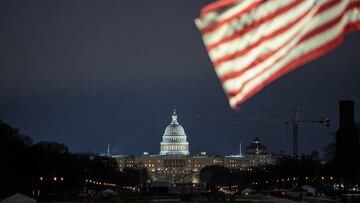Flag Day explained: what this holiday says about America’s secret history
Flag Day is celebrated on 14 June every year to commemorate the adoption of the first national flag by the Continental Congress on 14 June, 1777.


While seeing the Stars and Stripes flying from houses and buildings across the United States is a common sight, you may have noticed around 14 June that it is done with even more reverence. That is because the week surrounding that date is Flag Week, and the day itself Flag Day. So, some of you may be curious where the origins of Flag Day stem from.
During the American Revolutionary War, the Second Continental Congress passed a motion determining the first flag that would be used to represent the new nation. The decision was made on 14 June 1777 and in 1916, President Woodrow Wilson established the date as Flag Day.
A few decades later the US Congress passed a law that allows US presidents to proclaim an observance of the holiday. Cities and towns across the United States have planned parades and other celebrations for most of the twentieth century.
Quincy, Massachusetts, which has held a parade on Flag Day since 1952, continued the tradition this year. On 10 June, the small New England town hosted the 71st annual parade which featured “bands/drum corps, more than a dozen specialty units, public safety and veterans’ color guards, floats, and more than 1,000 flag-waving youngsters.”
On #FlagDay, we pay our respects to an enduring symbol of freedom and Democracy.
— Nancy Pelosi (@SpeakerPelosi) June 14, 2024
As we face threats to freedom, we renew our sacred pledge to defend Democracy and give proof through the night that our flag is still there – and as we pledge, with liberty and justice for all. pic.twitter.com/Iu9Ym1FRaP
The US flag is additionally “stands for hope, pride, and progress” which is displayed with honor on everything from our exports to our spacecraft flying high above. As well “it waves for justice and equality” flying high over our courthouses and schools, and where free and fair elections are held across the nation “reinforcing the promise of our democracy.”
The First US Flag
Related stories

Largest snake ever discovered in Colombia

How to get in on the US Army parade in DC
Some may recall from their grade school years that the first US flag was designed by seamstress Betsy Ross. Out of more than seventeen submissions, Ross’ flag was chosen for how its simple design was able to capture the spirit of the revolution. The simple design looks very similar to the one used today with one notable exception -- the number of stars. At the time of its creation, thirteen stars were used to represent each of the founding colonies that fought in the Revolutionary War.
As more states were added to the Union, so was a star for each of them. The most recent star to be added represents Hawaii, which became the 50th state in 1959.
Complete your personal details to comment